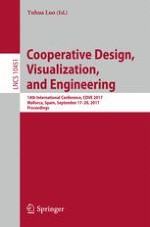
2017 | Supplement | Chapter
New Results on Possibilistic Cooperative Multi-robot Systems
Authors : Pilar Fuster-Parra, José Guerrero, Javier Martín, Óscar Valero
Published in: Cooperative Design, Visualization, and Engineering
Publisher: Springer International Publishing
Activate our intelligent search to find suitable subject content or patents.
Select sections of text to find matching patents with Artificial Intelligence. powered by
Select sections of text to find additional relevant content using AI-assisted search. powered by